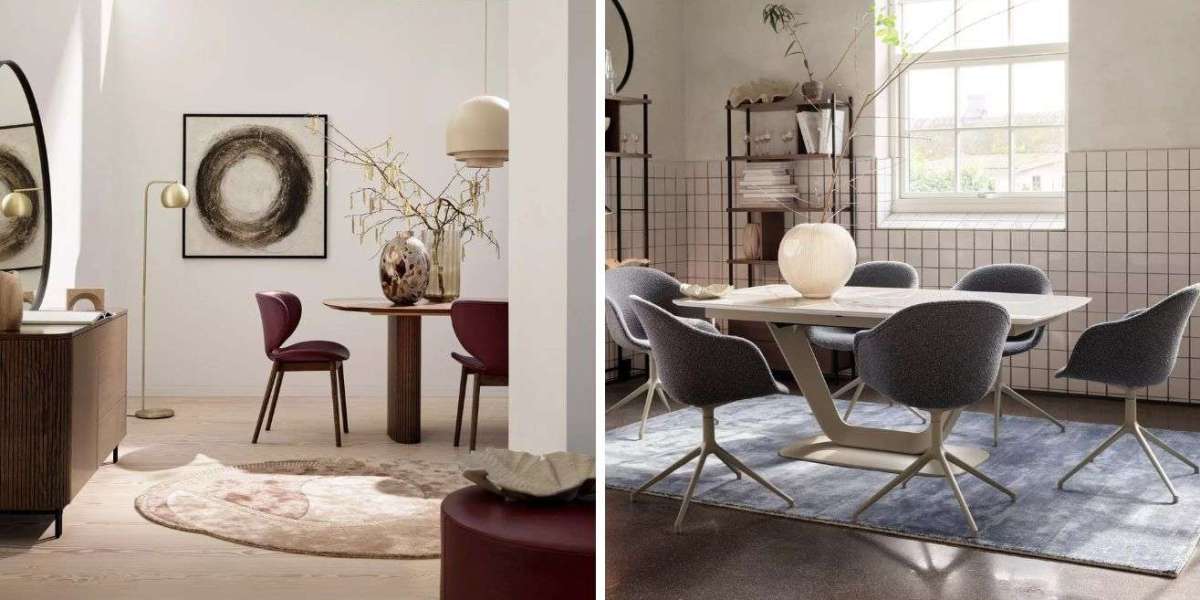The dining room is the heart of a home, a place where families gather, friends connect, and meals are shared. It’s not just a functional space; it’s a setting that reflects personal style and fosters community. Choosing the right dining room furniture design is critical to creating a space that is both beautiful and practical. From the dining table to chairs, storage solutions, and decorative elements, every piece plays a role in shaping the overall aesthetic and usability of the room. Here, we’ll explore key considerations and trends in dining room furniture design.
1. The Dining Table: The Focal Point
The dining table is the centerpiece of any dining room, setting the tone for the entire space. When selecting a table, consider the following factors:
Shape and Size: Rectangular tables are classic and versatile, ideal for larger rooms and accommodating more people. Round or oval tables, on the other hand, create a more intimate dining experience and are better suited for smaller spaces. Extendable tables offer flexibility, allowing you to adjust the size as needed.
Material: Wood remains a timeless choice, offering warmth and durability. Oak, walnut, and reclaimed wood are popular for their unique grains and rich finishes. Glass tables lend a modern, airy feel, while metal and stone options provide a sleek, industrial edge.
Design Style: From traditional farmhouse tables with carved legs to minimalist designs with clean lines, the style of the table should harmonize with the room’s overall theme.
2. Dining Chairs: Comfort Meets Style
Dining chairs are not just functional; they also contribute significantly to the room’s aesthetic. When selecting chairs, consider these elements:
Ergonomics: Comfort is paramount. Upholstered chairs provide a plush feel, while chairs with curved backs and armrests offer additional support for long meals.
Coordination with the Table: Matching the chairs to the table creates a cohesive look, but mixing styles can add visual interest. For instance, pairing a rustic wooden table with sleek, modern chairs creates a striking contrast.
Material and Finish: Wood, metal, and upholstered options abound. Choose materials that complement the table and align with your lifestyle. Upholstered chairs with stain-resistant fabrics are ideal for families with young children.
3. Storage Solutions: Functionality with Flair
Storage is essential in a dining room, particularly if the space is used for entertaining. Buffets, sideboards, and cabinets can provide much-needed storage while enhancing the room’s design.
Buffets and Sideboards: These versatile pieces can store dinnerware, linens, and serving dishes. Look for designs with a mix of drawers and cabinets for organized storage.
Display Cabinets: Glass-front cabinets allow you to showcase fine china, crystal, or decorative items. Choose a style that complements the dining table, whether it’s a vintage hutch or a sleek, modern cabinet.
Bar Carts and Wine Racks: For those who entertain frequently, a bar cart or built-in wine rack adds functionality and a touch of sophistication.
4. Lighting: Setting the Mood
Lighting plays a crucial role in dining room furniture design. The right lighting enhances the ambiance and highlights the furniture.
Chandeliers and Pendant Lights: A chandelier or a cluster of pendant lights above the dining table creates a focal point. Choose fixtures that match the room’s style, whether it’s a traditional crystal chandelier or a minimalist pendant.
Layered Lighting: Combine overhead lighting with wall sconces or table lamps to create a layered effect. Dimmer switches allow you to adjust the brightness to suit the occasion.
5. Decorative Elements: Personalizing the Space
Decorative touches make the dining room feel inviting and reflect your personality.
Area Rugs: A rug under the dining table anchors the space and adds texture. Ensure the rug is large enough to accommodate chairs, even when they’re pulled out.
Wall Art and Mirrors: Artwork and mirrors can enhance the room’s design. Mirrors create the illusion of space, while artwork adds color and character.
Table Centerpieces: Fresh flowers, candles, or decorative bowls can serve as elegant centerpieces. Change them seasonally to keep the room feeling fresh.
6. Design Trends in Dining Room Furniture
Modern dining room furniture design is characterized by a blend of form and function. Here are some popular trends:
Mix-and-Match Styles: Combining different styles, such as pairing vintage chairs with a modern table, creates an eclectic look.
Sustainable Materials: Eco-friendly furniture made from reclaimed wood or bamboo is increasingly popular.
Bold Colors and Patterns: While neutral tones remain a staple, bold colors and patterns are making a comeback in upholstered chairs and decorative accents.
Multifunctional Furniture: With smaller homes and open-concept layouts, furniture that serves multiple purposes, such as extendable tables and storage benches, is highly sought after.
7. Practical Considerations
When designing your dining room, keep practical aspects in mind:
Space Planning: Ensure there’s enough space for people to move around comfortably. A minimum clearance of 36 inches between the table and walls is recommended.
Durability: Choose materials that can withstand daily use. For example, solid wood and metal are more durable than veneer or particleboard.
Maintenance: Opt for furniture that’s easy to clean and maintain, especially if you have children or pets.
8. Creating a Cohesive Look
To create a cohesive design, ensure that all elements—furniture, lighting, and décor—work together harmoniously. Stick to a consistent color palette and style, and use accents to add depth and interest.
Conclusion
Designing a dining room by Boconcept is an opportunity to blend functionality with personal style. By carefully selecting furniture, considering practical needs, and incorporating thoughtful design elements, you can create a dining room that is both beautiful and welcoming. Whether you prefer a classic, modern, or eclectic aesthetic, the right furniture choices will make your dining room a cherished space for years to come.








